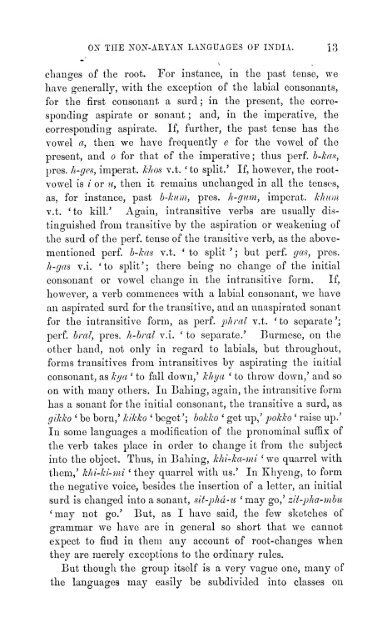You also want an ePaper? Increase the reach of your titles
YUMPU automatically turns print PDFs into web optimized ePapers that Google loves.
ON THE NON-ARYAN LANGUAGES OF INDIA. 13<br />
changes <strong>of</strong> <strong>the</strong> root. For instance, in <strong>the</strong> past tense, we<br />
have generally, with <strong>the</strong> exception <strong>of</strong> <strong>the</strong> labial consonants,<br />
for <strong>the</strong> first consonant a surd ; in <strong>the</strong> present, <strong>the</strong> corre-<br />
sponding aspirate or sonant ; and, in <strong>the</strong> imperative, <strong>the</strong><br />
corresponding aspirate. If, fur<strong>the</strong>r, <strong>the</strong> past tense has <strong>the</strong><br />
vowel a, <strong>the</strong>n we have frequently e for <strong>the</strong> vowel <strong>of</strong> <strong>the</strong><br />
present, and o for that <strong>of</strong> <strong>the</strong> imperative ; thus perf. h-kcn^,<br />
pres. h-ges, imperat. khos v.t. ' to split.* If, however, <strong>the</strong> root-<br />
vowel is i or u, <strong>the</strong>n it remains unchanged in all <strong>the</strong> tenses,<br />
as, for instance, past b-kum, pres. h-gum, imperat. khum<br />
v.t. 'to kill.' Again, intransitive verbs are usually dis-<br />
tinguished from transitive by <strong>the</strong> aspiration or weakening <strong>of</strong><br />
<strong>the</strong> surd <strong>of</strong> <strong>the</strong> perf. tense <strong>of</strong> <strong>the</strong> transitive verb, as <strong>the</strong> above-<br />
mentioned perf. h-kas v.t. * to split ' ; but perf. gas, pres.<br />
h-gas v.i. 'to split'; <strong>the</strong>re being no change <strong>of</strong> <strong>the</strong> initial<br />
consonant or vowel change in <strong>the</strong> intransitive form. If,<br />
however, a verb commences with a labial consonant, we have<br />
an aspirated surd for <strong>the</strong> transitive, and an unaspirated sonant<br />
for <strong>the</strong> intransitive form, as perf. jjhral v.t. 'to separate';<br />
perf. bral, pres. h-bral v.i. ' to separate.' Burmese, on <strong>the</strong><br />
o<strong>the</strong>r hand, not only in regard to labials, but throughout,<br />
forms transitives from intransitives by aspirating <strong>the</strong> initial<br />
consonant, as kya ' to fall down,' khija ' to throw down,' and so<br />
on with many o<strong>the</strong>rs. In Bahing, again, <strong>the</strong> intransitive form<br />
has a sonant for <strong>the</strong> initial consonant, <strong>the</strong> transitive a surd, as<br />
gikko ' be born,' kikko ' beget'; bokko ' get up,' pokko ' raise up.'<br />
In some <strong>languages</strong> a modification <strong>of</strong> <strong>the</strong> pronominal suffix <strong>of</strong><br />
<strong>the</strong> verb takes place in order to change it from <strong>the</strong> subject<br />
into <strong>the</strong> object. Thus, in Bahing, khi-ka-mi ' we quarrel with<br />
<strong>the</strong>m,' khi-ki-mi ' <strong>the</strong>y quarrel with us.' In Khyeng, to form<br />
<strong>the</strong> negative voice, besides <strong>the</strong> insertion <strong>of</strong> a letter, an initial<br />
surd is changed into a sonant, sit-phd-ii 'may go,' zit-jy/ia-mbu<br />
'may not go.' But, as I have said, <strong>the</strong> few sketches <strong>of</strong><br />
grammar we have are in general so short that we cannot<br />
expect to find in <strong>the</strong>m any account <strong>of</strong> root- changes when<br />
<strong>the</strong>y are merely exceptions to <strong>the</strong> ordinary rules.<br />
But though <strong>the</strong> group itself is a very vague one, many <strong>of</strong><br />
<strong>the</strong> <strong>languages</strong> may easily be subdivided into classes on

















